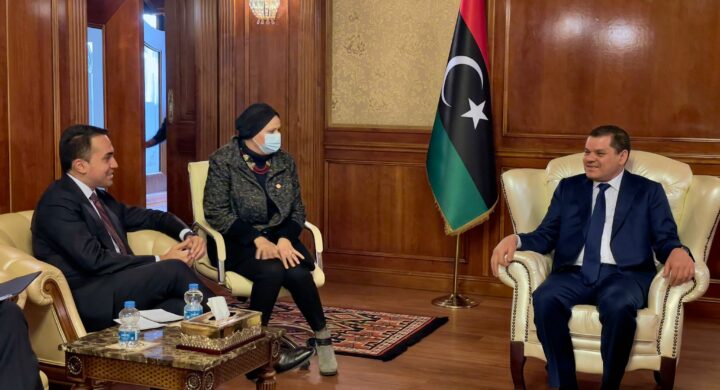Italy is ramping up efforts to become the springboard for Western efforts towards the stabilisation of Libya, which has the potential to impact that of the wider North African and Mediterranean regions. Here’s what makes Rome a good candidate
On Sunday, the Italian foreign minister Luigi Di Maio made his way to Tripoli for an unscheduled meeting with officials of the National Unity Government (NUG). That was the first high-level visit between a senior Western official and the newly established Libyan administration, which was sworn in on March 15th and is tasked with ferrying the country to fresh elections in December.
Mr Di Maio met with Libyan prime minister Abdulhamid Dabaiba, president of the Presidential Council Mohamed Menfi, and foreign minister Najlaa al Manqoush, the first woman to take on that role. Their discussions touched upon stability, migration, and revamping the Libyan economy.
Italy played an important part in mediating between the Libyan factions and enforcing the UN-mandated arms embargo around Libya (with limited success). The diplomatic visit most likely preludes to a new chapter of Italy’s projection in the Mediterranean as a stabilising force, a spearhead of Western efforts in the region, and a valuable economic partner for Libya’s recovery.
It is no coincidence that Mr Di Maio was accompanied by Claudio Descalzi, managing director of the Italian energy company Eni, who met with Mr Dabaiba as well as Mohamed Aoun, minister for petrol. Italy is moving to promote its interest – which revolve around stability in the Mediterranean area and often overlap with Libya’s own – and is willing to do so as a whole, acting on the institutional and humanitarian as well as the industrial level.
Oil is a crucial asset to shore up Libya’s economy, in tatters after a decade of instability, and restarting production in the country’s Eastern fields is instrumental in that sense. The NUG-Eni talks focussed on the latter’s activities in Libya as well as responding to the growing global demand for renewable energy.
The Libyan PM underscored the need for Eni to “invest and promote social responsibility in the health, education, professional formation and electricity sectors,” which the Italian company has been minding for the past decade. Mr Descalzi expressed Eni’s full commitment for the country’s projects, a focus on natural gas and the will to minimise the most carbon-emitting sources.
Tellingly, these meetings also happened at the eve of, the first bilateral summit between Italy and the US – in the form of Anthony Blinken, US Secretary of State, and the Italian FM Di Maio – since President Joe Biden (and the Italian PM Mario Draghi) took office.
Mr Blinken welcomed the creation of the NUG, and he also embodies Mr Biden’s intention of refocussing on the Mediterranean – albeit mostly through allies. On his part, Mr Di Maio can remark Rome’s active role in the stabilisation of Libya as well as the wider counterterrorism efforts in the neighbouring Sahel region, which the Italian defence minister Lorenzo Guerini wants to morph into an EU-wide operation.
According to Arturo Varvelli, director of the Rome-Based European Council on Foreign Relations, Italy is bent on realigning the US and the EU’s actions in Northern Africa, and particularly Libya. “To meet [Mr] Blinken after the Libya visit also means to have something to say to [our] allies,” he pointed out to Formiche.net.
The expert also underscored the need for affirmative action. “We need a stronger European support for the new Libyan government, with the US’ approval, [as general] Khalifa Haftar and other spoilers could compromise the NUG’s good start,” he said.
Russia, “remains present” in the country’s East, in support of general Haftar, and it “must be contained”. Similarly, Turkey (a NATO member at odds with its colleagues) still holds a significant military presence in the country. All the more reasons for the US to contrast the foreign powers that threaten Tripoli’s stability.
This line seems to resonate across the Atlantic. “As an interested but not warring party, the United States could help bolster the fragile new order,” wrote The Washington Post’s editorial board. “While the Biden administration does not have much leverage in Moscow, it can push Turkey, Egypt and the United Arab Emirates to stop shipping weapons into the country.”
“It can help Mr Dbeibah restore services, fight the coronavirus pandemic and make preparations for the promised elections […] That would be a good use of diplomatic resources, with the potential payoff of rescuing at least one country from the wreckage of the Arab Spring.”








